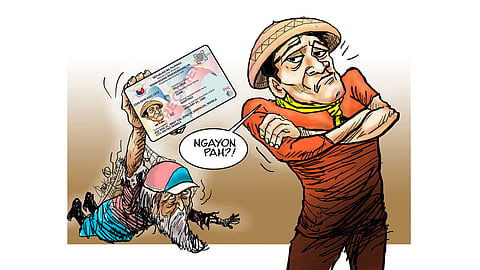
- NEWS
- the EDIT
- COMMENTARY
- BUSINESS
- LIFE
- SHOW
- ACTION
- GLOBAL GOALS
- SNAPS
- DYARYO TIRADA
- MORE

For years, many Filipinos have been waiting in frustration for the arrival of their national IDs. Launched with the promise of streamlining government services, improving identification processes, and reducing bureaucratic inefficiencies, the national ID system was seen as a major milestone for the Philippines.
Yet, despite the fanfare surrounding its launch, the project was hampered by significant delays, mostly attributed to the underperformance of the supplier responsible for producing the IDs.
In a move that will undoubtedly be a relief to millions of citizens, the Bangko Sentral ng Pilipinas (BSP) recently decided to terminate the contract of this supplier, signaling a potential resolution to the long-standing issues surrounding the program.
The Philippine Identification System Act, signed into law in August 2018, sought to create a single, unified ID for all Filipino citizens and resident aliens. The national ID was designed to streamline access to government services, particularly for the poor and marginalized, who often struggle to provide the various forms of identification required by government offices.
It was envisioned to serve as a key to more efficient delivery of services, from healthcare to financial inclusion, and to foster a more digitally connected and secure society. With over 110 million people in the country, the national ID system was a massive undertaking, but one that was urgently needed to modernize public administration.
Despite its lofty goals, the national ID project quickly ran into a series of challenges. One of the most prominent issues was the chronic delay in the production and distribution of the physical ID cards. While millions of Filipinos successfully registered for the ID, many were left in limbo as the delivery dates kept being postponed. Stories of Filipinos waiting for over a year after registration became commonplace, and online complaints began piling up.
The delays were blamed on various logistical issues, including problems with the procurement and production of the physical cards. The supplier, tasked with the enormous job of delivering millions of ID cards to the registered population, failed to meet its contractual obligations. With the cards becoming a scarce commodity, frustration began mounting. What was meant to be a tool for reducing red tape was now seen as another source of inefficiency and bureaucratic ineptitude.
Faced with mounting pressure, the BSP made the bold decision to terminate the contract with the underperforming supplier. This move marks a decisive step in rectifying the issue, sending a clear message that incompetence in delivering public services will not be tolerated. The BSP, as the primary overseer of the national ID project, was fully aware of the gravity of the situation, as millions of Filipinos have been left waiting for a promised service.
In their statement, the BSP emphasized that the supplier’s failure to meet contractual commitments was the primary reason for the termination. The central bank indicated that it was looking into alternative solutions to expedite the production and distribution of the IDs, reassuring the public that it remains committed to the success of the national ID program.
The delays in the national ID project have had significant repercussions on Filipinos’ lives. For many, the ID is more than just a piece of plastic—it is a gateway to government services, access to healthcare, social benefits, and formal employment. The lack of an ID has continued to exacerbate the exclusion of those already marginalized, delaying the intended benefits of the system.
In addition, the delays have damaged public trust in the government’s ability to execute large-scale programs efficiently. The project, which had been positioned as a beacon of modernization, was slowly becoming an example of government mismanagement, much to the dismay of the public.
The termination of the contract, however, may help restore some faith. It is a sign that the government is willing to hold contractors accountable and take corrective action when necessary. Yet, the road ahead remains fraught with challenges.
While the termination may put an end to one phase of the problem, the government must act swiftly to ensure that a new, reliable supplier is brought in and that no further delays take place.
